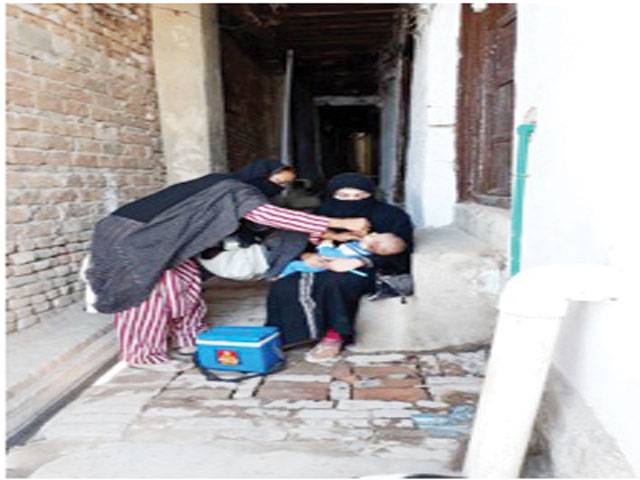Kalabagh City, Mianwali – An old woman holding a pen, a white clipboard and blue vaccine carrier knocks at a door of a small house atop a hill in the Kalabagh City of Mianwali. “Have the children returned”, she asks politely behind the door. Moments later a woman appears behind the door with two children who could not be vaccinated during the polio worker’s previous visit because they were sleeping. She administers both the children two drops of Oral Polio Vaccine and moves to the next house on the dead end of the street for the same exercise.
For the visitor the walk up to the city perched on the hill is not a toll-free exercise. But, Sehat Muhafiz polio team member Bilqees Bibi, 55, packs such an unflinching commitment to her duty that she takes a brisk walk atop the hill and returns over and over again to deliver the safe vaccine to the missed children.
She navigates through the thin alleys of the neighborhood during the polio vaccination campaign, checks multi-storeyed houses and vaccinates all children up to the age of five years.
Bilqees Bibi, visits almost 150 houses every day, during the vaccination campaign. She revisits some of the houses multiple times to ensure the children that were either away from home or sleeping when she visited first, get the essential two drops of the oral polio vaccine.
“It’s like working in my house and with my family, my own children”, the Sehat Muhafiz health worker observes. “I make sure that no child is deprived of the vaccine in every campaign. Vaccine doses are very important to avert risks to children, especially when there is a proof of virus circulation in the area”, Bibi says.
“The biggest challenge is to maintain the efficacy of the vaccine vial stored in the carrier by maintaining its temperature. During summer, I use additional ice packs and store minimum number of vaccine vials in the carrier. This adds to my burden because I have to go back again and again to collect the vials from vaccine store room”, she explains.
Bilqees Bibi has been instrumental in addressing resistance to polio vaccination by a very small section of community in the wake of rumors around vaccine safety that went viral on social media in recent months. “Some of the parents who hear rumours from different sources ask me questions about vaccine safety. Since I am a local in the area parents consider me as their family member. I tell them that I have never seen a child who has died of the vaccine or had any negative implication”, Bilqees says reassuringly.
After the negative propaganda, Pakistan Pediatrics Association (PPA) and Islamic Advisory Group (IAG) confirmed that the oral polio vaccine is one of the safest vaccines ever developed. It is so safe it can be given to sick children and newborns. It has been used all over the world to protect children against polio, saving at least 5 million children from permanent paralysis by polio, says a statement by the PPA and IAG.
Director General Health Services and Coordinator of the Emergency Operations Centre for Polio Eradication, Dr. Munir Ahmad reiterates that OPV is sensitive to high temperatures and loses potency if exposed to heat for prolonged periods of time.
“A stringent system of refrigeration, cold boxes and vaccine carriers, called the cold chain system, is put in place to ensure that OPV maintains the recommended temperature through its entire journey until it is administered to a child,” he adds.
In addition, “the vials of OPV are equipped with heat sensitive indicator on labels which is called the vaccine vial monitor (VVM). The VVM allows health workers to know if the vaccine has been exposed to heat. Workers administer drops only with vials having valid VVM and expiry date,” Dr Munir says.
He further confirms that Pakistan polio programme has got certification from WHO approved lab in Islamabad which authenticates that all the ingredients and quality of the vaccine are safe for human consumption. Today thousands of local Sehat Muhafiz polio workers like Bilqees Bibi continue to reach children in the highly sensitive districts with a mission to eradicate polio in 2018. “With the help of parents, I am sure we will be able to eradicate polio from our home this year”, a resolute Bilqees Bibi adds.
Pakistan Polio Eradication Programme has come a long way toward building a future in which polio no longer endangers children, families, and communities across our country. 2017 proved another historic year for the programme as Pakistan registered an overall 97% drop in cases from the dire situation of 2014 - cases consistently dropped from highs of 306 to 54 in 2015 to 20 in 2016, and only 8 in 2017.
In 2018, only three children have been paralyzed by polio in Pakistan so far. All the three cases have been reported from Dukki in Balochistan. This is a stark reminder that the war against polio is yet to be won and the final battle is proving difficult. Our strong nationwide polio surveillance indicates that the virus continues to circulate in a few remaining sanctuaries including South Punjab, Rawalpindi-Islamabad, Karachi, Peshawar and Quetta block. We must remember that as long as there is virus anywhere in the country, no child is safe from being infected.






